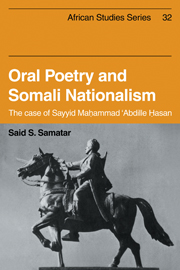Book contents
- Frontmatter
- Contents
- List of illustrations
- List of figures
- List of tables
- Note on transcription of Somali words
- Preface
- Introduction
- 1 Elements of Somali pastoral oratory: Prose
- 2 Elements of Somali pastoral oratory: Poetry
- 3 Occupation and resistance: The rise of the Somali Dervishes
- 4 Poetic oratory and the Dervish movement
- 5 Myth and the Mullah
- Notes
- Select bibliography
- Index
- Titles in the series
- Frontmatter
- Contents
- List of illustrations
- List of figures
- List of tables
- Note on transcription of Somali words
- Preface
- Introduction
- 1 Elements of Somali pastoral oratory: Prose
- 2 Elements of Somali pastoral oratory: Poetry
- 3 Occupation and resistance: The rise of the Somali Dervishes
- 4 Poetic oratory and the Dervish movement
- 5 Myth and the Mullah
- Notes
- Select bibliography
- Index
- Titles in the series
Summary
This is a study of the use of oratory and oratorical techniques as a tool to obtain political power in a traditional African society. In an attempt to bring forth the causal linkages between oral poetry, politics and power in Somali society, I have chosen to focus on the political oratory of Sayyid Maḥammad ʿAbdille Ḥasan, the poet, mystic and warrior leader of the Somali anti-colonial movement at the turn of the century. In selecting the political verse of the Somali leader as a case study, my efforts here aim at several interconnected objectives. One is to investigate the Sayyid's poetic oratory which, aside from its relevance to the politics and strategy of creating a large-scale resistance movement, possesses an intrinsic literary and philosophical interest, and therefore deserves to be studied on its own merits. Another emanates from the need to enquire into the ways and means by which an African resister of imperialism harnessed a remarkable indigenous resource in order to mobilize the public in his favor and against his opponents. Finally, by demonstrating the intimate correlation between the Sayyid's oratorical powers, which he used consciously – and consummately – to achieve political ends, and the progress (or lack of progress) of the Somali resistance struggle, I hope to add a new element to the study of African resistance in general.
More specifically, it is hoped that the elucidation in this book of the Sayyid's use of oral poetry as a weapon to rid his country of alien rule will encourage others to investigate the indigenous weapons of African resisters of imperialism elsewhere.
- Type
- Chapter
- Information
- Oral Poetry and Somali NationalismThe Case of Sayid Mahammad 'Abdille Hasan, pp. ix - xiiPublisher: Cambridge University PressPrint publication year: 1982

